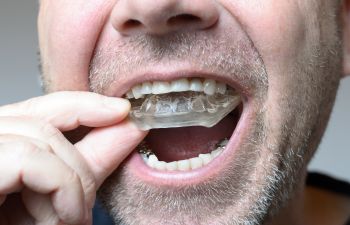
Teeth grinding, also known as bruxism, is not uncommon. Patients of all ages are subject to this oral habit. While clenching and grinding can occur during the day, it is most often performed during nighttime sleep. Unfortunately, there are more significant concerns with grinding teeth at night because that’s when the forces can be greater and for more prolonged periods of time.
Why is Bruxism Bad?
An occasional struggle with bruxism is not typically a threat. However, if you grind or clench your teeth on a regular basis, it can take a toll on your oral health. During nighttime bruxism, you are placing incredible pressures on your teeth and jaw that are much greater than they were intended to handle. Over time, the grinding and clenching can cause the following primary disturbances in your oral health:
- Worn down or flat teeth
- Cracked teeth
- Sensitive teeth
- Damaged dental work (crowns, bridges, fillings)
- Jaw pain, stiffness and popping
- Ear pain and headaches related to TMJ irritation
Determine Why You Grind Your Teeth
The cause of your teeth grinding habit is not always easy to pinpoint, especially since many patients perform the act subconsciously in their sleep. However, there is evidence that suggests that stress is a leading culprit to bruxism. If you don’t feel stressed or anxious, it is possible that your teeth grinding is a byproduct of untreated TMJ disorder, tooth loss, misalignment, bite imbalance or an injury to the face or jaw.
How Your Dentist Can Help
If your partner informs you of your nightly bruxism habit or if you notice signs that you are grinding (worn down teeth, painful jaw or morning headaches), then you should strongly consider going to your dentist. In fact, it can be very difficult to stop a nighttime teeth grinding habit on your own.
At Muccioli Dental, we can evaluate your smile for signs of wear and friction to assess the severity of your bruxism disorder. For most cases, a custom oral appliance or mouthguard can be made to protect your teeth from grinding, reduce the strain on your jaw joint and even prevent future episodes. Other treatment options may include placing a crown or using orthodontics to improve bite balance and alignment, as this will ease the tension on jaw joints that may be constantly trying to find a comfortable resting place. Don’t let your bruxism habit threaten your smile’s health and beauty. Call Muccioli today for teeth grinding and/or TMJ treatment.
Posted on behalf of Dr. Randy Muccioli, Muccioli Dental
Muccioli Dental - Johns Creek Dentist
6300 Hospital Pkwy, Suite 275
Johns Creek, Georgia 30097
Phone: (678) 389-9955
